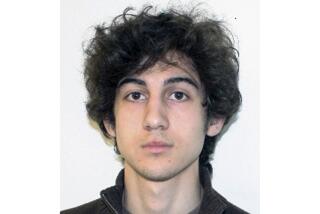Suspect acquitted in N. Ireland bombing
A 38-year-old electrician accused in the worst bombing in the long history of violence in Northern Ireland was acquitted Thursday by a judge who decried what he called sloppy and deceptive work by investigators.
As spectators were stunned into silence or erupted in enthusiastic cheers, Justice Reg Weir said slipshod handling of the forensic evidence made it impossible to rise beyond reasonable doubt in the case of Sean Hoey. The defendant was charged with 29 counts of murder in the 1998 bombing of the shopping district in Omagh that left 29 dead, including a woman pregnant with twins, and 370 injured.
The ruling, which came after the judge deliberated for nearly 11 months, ends most hopes of a conviction in the case that marked a turning point in the region’s 30 years of violence between predominantly Roman Catholic republicans seeking a united Ireland and Protestants loyal to the union with Britain.
A splinter republican group opposed to a tentative 1997 peace deal, the Real IRA, initially claimed responsibility for planting the 500-pound bomb in a car parked on one of the town’s main thoroughfares on a busy Saturday afternoon.
“I am acutely aware that the stricken people of Omagh and every other right-thinking member of the Northern Ireland community would very much wish to see whoever was responsible for the outrageous events of August 1998 and the other serious crimes in this series of terrorist incidents convicted and punished for their crimes,” the judge said.
Weir also acquitted Hoey of several other terrorism-related charges stemming from a series of mortar, car and roadside bomb attacks in the months before the Omagh bombing.
But the judge said prosecutors had not proved beyond reasonable doubt that all the explosive devices were made by one person. And he said he was not satisfied that fibers found on one such device matched those from a mobile home where Hoey lived.
Weir was also highly critical of the bagging, labeling and recording of exhibits, hitting out at the “slapdash approach” and “cavalier disregard” the police and some experts had for the integrity of forensic items.
The judge said two police officers had told untruths in a deliberate attempt to beef up statements and said there had been a “deliberate and calculated deception” which made it impossible for him to accept their evidence.
The trial that concluded in January was one of the biggest murder trials in British history. The investigation, the bulk of which was conducted under an earlier administration of Northern Ireland’s police force, cost a purported $32 million.
Hoey, who comes from South Armagh near the border with the Republic of Ireland, has been in custody for four years.
He never testified, but made statements to police claiming that if his DNA was found on any evidence, it was either there innocently or had been planted.
“I would personally like to thank those among the Omagh families who have all suffered immensely, but eventually saw this as an injustice and had the . . . conviction to speak out,” Rita Hoey, the defendant’s mother, said after the ruling.
“I want them all to know that this is not a failure to bring those responsible to justice. Sean is innocent.”
Hoey’s uncle, bar owner Colm Murphy, was also charged in the case but his conviction was thrown out in 2005 because of concerns over police conduct. He faces a new trial.
Michael Gallagher, whose son Aidan was killed in the bombing, called for an inquiry into the attack by the British and Irish governments.
“Yes, we put the police under severe pressure to get a prosecution, but we wanted a prosecution that was a strong prosecution,” he said. “There’s at least 10 people who will be sitting at their Christmas dinners this year who were involved in the Omagh bomb, and the intelligence service know these people . . . you could not but feel extremely let down by what has happened today.”
--
Special correspondent Graham reported from Belfast and Times staff writer Murphy from London.
More to Read
Start your day right
Sign up for Essential California for news, features and recommendations from the L.A. Times and beyond in your inbox six days a week.
You may occasionally receive promotional content from the Los Angeles Times.






